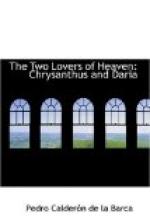“Calderon is one of the three greatest names in Spanish literature, Lope de Vega and Cervantes being the other two. He is also a great name in the universal realm of letters, though out of Spain he is little more than a great name, except in Germany, that land so hospitable to famous wits, and where, to readers and critics of a mystical and transcendental turn, his peculiar genius strongly commended him. To form a notion of what manner of man Calderon was, we must imagine a writer hardly inferior to Shakespeare in fertility of invention and dramatic insight, inspired by a religious fervour like that of Doune or Crashaw, and endowed with the wild and ethereal imagination of Shelley. But the religious fervour is Catholic, not Protestant, Southern, not Northern: it is intense, mystical, and ecstatic: like a tongue of upward-darting flame, it burns and trembles with impassioned impulse to mingle with empyrean fire. The imagination, too, is not merely southern, but with an oriental element shining through it, like the ruddy heart of an opal”. . .
“But our purpose is not to speak of Calderon, but of his translator Mr. MacCarthy; and to make our readers acquainted with his very successful effort to reproduce in English some of the most characteristic productions of the genius of Spain, retaining even one of the peculiarities in the structure of the verse which has hardly ever been transplanted from the soil of the peninsula”. . . .
“Mr. MacCarthy’s translations strike us as among the most successful experiments which have been made to represent in our language the characteristic beauties of the finest productions of other nations. They are sufficiently faithful, as may be readily seen by the Spanish scholar, as the translator has the courage to print the original and his version side by side. The rich, imaginative passages of Calderon are reproduced in language of such grace and flexibility as shows in Mr. MacCarthy no inconsiderable amount of poetical power. The measures of Calderon are retained; the rhymed passages are translated into rhyme, and what is more noticeable still, Mr. MacCarthy has done what no writer in English has ever before essayed, except to a very limited extent—he has copied the asonantes of the original”. . . .
“We take leave of Mr. MacCarthy with hearty acknowledgments for the pleasure we have had in reading his excellent translations, which have given us a sense of Calderon’s various and brilliant genius such as we never before had, and no analysis of his dramas, however full and careful, could bestow”.
From a Review of “Love the Greatest Enchantment”, etc., in the “New York Tablet”, July 19, 1862, written by the gifted and ill-fated Hon. Thomas D’Arcy M’Gee, of Montreal.




